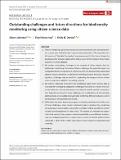Outstanding challenges and future directions for biodiversity monitoring using citizen science data
Abstract
1 There is increasing availability and use of unstructured and semi-structured citizen science data in biodiversity research and conservation. This expansion of a rich source of 'big data' has sparked numerous research directions, driving the development of analytical approaches that account for the complex observation processes in these datasets. 2 We review outstanding challenges in the analysis of citizen science data for biodiversity monitoring. For many of these challenges, the potential impact on ecological inference is unknown. Further research can document these impacts and explore ways to address them. In addition to outlining research directions, describing these challenges may be useful in considering the design of future citizen science projects or additions to existing projects. 3 We outline challenges for biodiversity monitoring using citizen science data in four partially-overlapping categories: challenges that arise as a result of 1) observer behaviour; 2) data structures; 3) statistical models; and 4) communication. Potential solutions for these challenges are combinations of: a) collecting additional data or metadata; b) analytically combining different datasets; c) developing or refining statistical models. 4 Whilst there has been important progress to develop models that tackle most of these challenges, there remain substantial gains in biodiversity monitoring and subsequent conservation actions that we believe will be possible by further research and development in these areas. The degree of challenge and opportunity that each of these presents varies substantially across different datasets, taxa, and ecological questions. In some cases, a route forward to address these challenges is clear, whilst in other cases there is more scope for exploration and creativity.
Citation
Johnston , A , Matechou , E & Dennis , E 2023 , ' Outstanding challenges and future directions for biodiversity monitoring using citizen science data ' , Methods in Ecology and Evolution , vol. 14 , no. 1 , pp. 103-116 . https://doi.org/10.1111/2041-210X.13834
Publication
Methods in Ecology and Evolution
Status
Peer reviewed
ISSN
2041-210XType
Journal article
Description
Funding: AJ was partially funded through the 2017-2018 Belmont Forum and BiodivERsA joint call for research proposals, under the BiodivScen ERA-Net COFUND program, with financial support from the Academy of Finland (AKA, Univ. Turku: 326327, Univ. Helsinki: 326338), the Swedish Research Council (Formas, SLU: 2018-02440, Lund Univ.: 2018-02441), the Research Council of Norway (Forskningsrådet, NINA: 295767) and the U.S. National Science Foundation (NSF, Cornell Univ.: ICER-1927646).Collections
Items in the St Andrews Research Repository are protected by copyright, with all rights reserved, unless otherwise indicated.

